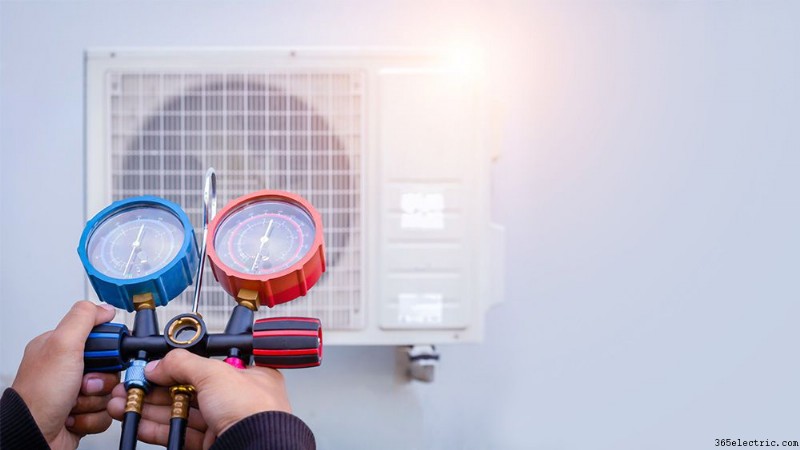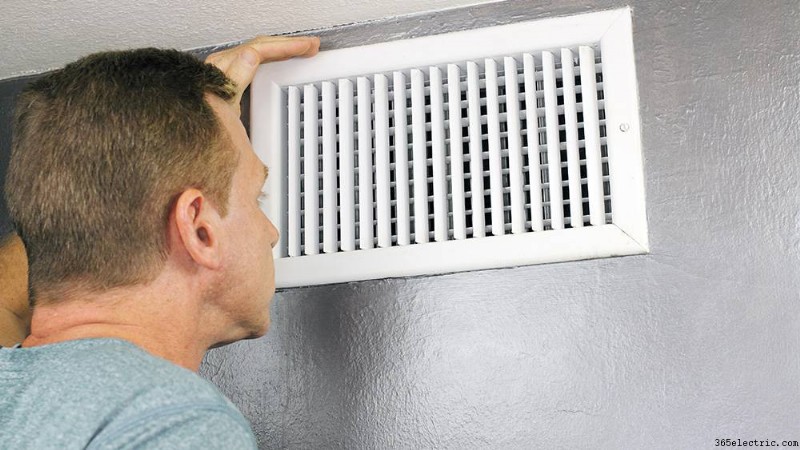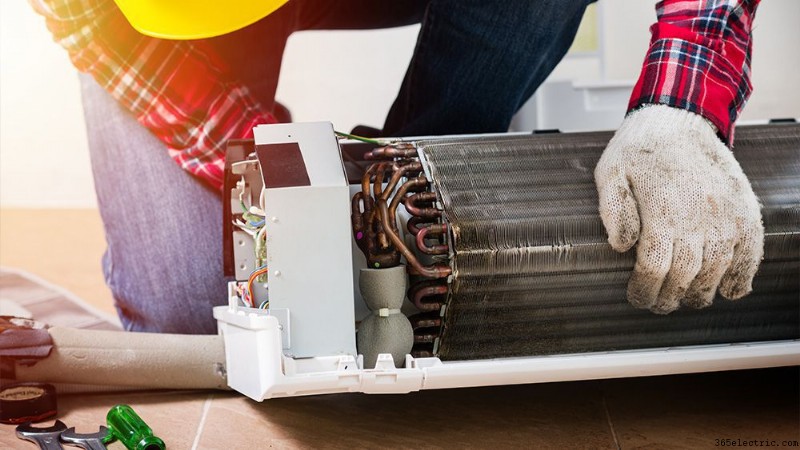Che aspetto ha una perdita di refrigerante? 11 segni di una perdita di refrigerante AC che non dovresti mai ignorare

Il refrigerante, noto anche come refrigerante o Freon, è probabilmente la parte più importante del tuo condizionatore d'aria. Il refrigerante AC è un composto chimico responsabile dell'assorbimento del calore dall'aria interna, espellendolo all'esterno e quindi fornendo aria fresca. Cambia il suo stato da fluido a gas e viceversa mentre scorre attraverso i vari componenti del tuo condizionatore d'aria per fornire aria fresca (o calore nel caso di un AC reversibile).
Che tu abbia un condizionatore d'aria canalizzato o senza condotto, utilizza il refrigerante per raffreddare la tua casa.
A volte, un refrigerante AC può fuoriuscire, ostacolando così gravemente la capacità di raffreddamento del tuo AC. Se il tuo condizionatore d'aria non si raffredda bene, le bollette sono improvvisamente più alte, l'acqua gocciola o noti altri segni discussi di seguito, devi verificare la presenza di una perdita di refrigerante AC.
Se sospetti una perdita di refrigerante o vuoi semplicemente conoscerla in anticipo per evitare problemi in seguito, allora questo articolo fa per te! Esplora:
- Pericoli di una perdita di refrigerante AC
- Cause di una perdita di refrigerante o AC Freon
- Segni di perdita di refrigerante dal condizionatore d'aria
- Cosa fare se si sospetta una perdita di refrigerante
- Come prevenire le perdite di refrigerante AC
Pericoli di una perdita di refrigerante AC
Sebbene il Freon non abbia alcun sapore o odore, ha un impatto su di noi e sull'ambiente circostante. Una perdita di refrigerante è dannosa per l'ambiente, la salute e l'unità HVAC.
Pericolo per l'ambiente
È stato scoperto che i CFC stanno esaurendo lo strato di ozono, a causa del quale sono stati gradualmente eliminati. Tuttavia, sono stati sostituiti con idrofluorocarburi (HFC) e idroclorofluorocarburi (HCFC), che presentano una serie di problemi. Sono gas serra estremamente potenti. Ad esempio, l'HFC 134-a, un popolare refrigerante, ha 3400 volte il potenziale di riscaldamento globale dell'anidride carbonica. Mentre il refrigerante R410A o i suoi aggiornamenti vengono trasferiti al giorno d'oggi, molti condizionatori d'aria sono ancora costituiti da Freon o HFC.
La prevenzione e la correzione immediata delle perdite di refrigerante, insieme allo smaltimento responsabile del condizionatore d'aria a fine vita, possono fare molto per ridurre l'impatto ambientale delle unità HVAC.
Pericolo per l'uomo
La perdita di freon è sicuramente un pericolo per la salute e, in caso di ricarica, dovrebbe essere gestita solo da un esperto. Se si è esposti al refrigerante per un periodo di tempo considerevole, si può soffrire di "avvelenamento da refrigerante". Sebbene l'avvelenamento accidentale da refrigerante sia raro, è comunque necessario essere consapevoli dei possibili pericoli. I sintomi di avvelenamento da refrigerante da lieve a moderato includono:
- Mal di testa
- Vertigini
- Vomito
- Nausea
- Tosse
- Irritazione di occhi, orecchie e gola
Per evitare l'avvelenamento accidentale da refrigerante dovuto a una perdita di refrigerante, far riparare qualsiasi perdita il prima possibile.
Un grave avvelenamento da refrigerante è comune solo tra le persone che usano un refrigerante come droga ricreativa e può causare perdita di coscienza, convulsioni, coma o morte improvvisa.
Pericolo per il tuo condizionatore
Poiché un refrigerante è l'agente di raffreddamento, una perdita di refrigerante dal condizionatore d'aria può danneggiare gravemente le prestazioni del tuo condizionatore.
Quando il tuo condizionatore d'aria ha un basso livello di freon, mette a dura prova i componenti dell'unità. L'unità AC deve lavorare di più per raggiungere la temperatura impostata, il che può portare al guasto del compressore se ignorato per lungo tempo. Può anche causare il congelamento delle bobine CA, l'aumento delle bollette e un raffreddamento complessivamente inefficiente.
4 Cause di perdita di refrigerante o di freon AC
Ci sono numerose cause dietro una perdita di Freon. Il refrigerante non è qualcosa che si esaurisce o si esaurisce nel tempo; perde a causa di un problema che porta a piccoli fori che consentono la fuoriuscita del refrigerante. Alcune delle cause più comuni includono:
1. Usura dell'unità AC
L'usura dovuta all'età è una causa comune delle perdite di refrigerante del condizionatore d'aria. Nel tempo, le articolazioni e le connessioni dell'AC possono indebolirsi ed erodersi. Inoltre, le guarnizioni in gomma attorno alle valvole di servizio o ai raccordi di accesso possono usurarsi e causare perdite di refrigerante.
Moreover, if you delay or neglect HVAC repairs and maintenance for a long time, you will face this issue sooner than expected.
2. Pinhole Leak
Also known as ‘Champagne leaks’ since they create tiny bubbles, pinhole leaks are very minute holes in your AC coils. They normally occur in older units as a result of degradation over time and the main cause is certain acids such as Formic formed by Volatile Organic Compounds (VOCs) that are generally present in the air. Products such as air fresheners, glues or paints contain VOCs making it very easy for them to reach your indoor air conditioning unit. Overtime, these can eat or corrode your AC’s copper tubing causing tiny leaks.
Due to the vulnerability of copper tubing to VOCs forming formic acid, manufacturers are starting to switch to aluminum coils.
3. Vibrations
Your compressor motor, located outside, is an important component of your AC. If your outdoor unit is improperly sealed, it can generate severe vibrations, weakening refrigerant lines. Moreover, if your refrigerant lines were improperly installed in the first place, even mild vibration caused by the system’s running could wear holes in the copper coils, leading to an AC refrigerant leak.
4. Physical Damage
Children, animals, and lawnmowers have the potential to cause damage to your outdoor unit. In addition, lawnmowers can project their cuttings towards the outdoor unit, leading to debris build-up. Children and animals can accidentally hit or throw something while playing. This can also cause all sorts of physical damage. To prevent any damage to your outdoor AC unit, surround it with a block wall or install it higher up.
Read our guide to learn how to hide the air conditioner unit outside.
11 Signs of an AC Refrigerant Leak
Has your AC been acting up recently, and you can’t figure out why? If your AC isn’t turning on or its performance has taken a hit, a leaking refrigerant might be the cause to blame. Here are some signs your AC may have an air conditioner coolant leak:
1. Decreased Cooling Ability
The refrigerant absorbs heat from your home and releases it outside. If you have low refrigerant levels, effective heat transfer cannot take place. Thus, if your air conditioner has suddenly lost its cooling ability and doesn’t narrow down to any other cause, a refrigerant leak may be to blame.
2. AC Not Blowing Cold Air

A quick test is to place your hand right in front of your vents. If the air coming from the vents feels warm and you’ve tried everything to fix it but failed, then your AC could have a Freon leak.
3. Long Cooling Cycles
When your AC has a refrigerant leak, it often has a harder time reaching the set temperature on the thermostat. As a result, your HVAC unit must run longer than usual to achieve the desired temperature. If you notice your air conditioner is taking too long to reach a certain temperature, it’s best to get it checked.
4. Low Airflow
Place your hand directly in front of your AC vents. If the air is cold, but the airflow is too low, you may have a refrigerant leak. An air conditioner with a coolant leak cannot produce as much cold air as normal. While there may be many causes behind poor HVAC airflow, it may be due to a leak if everything else seems fine.
5. Unexpectedly High Electricity Bills
Due to a lack of coolant, your AC needs to work harder to cool your room effectively, leading to higher electricity bills.
If your electricity bills have skyrocketed despite no change in consumption, an HVAC refrigerant leak could be to blame. Increased bills indicate your AC is working longer than normal to reach your desired thermostat settings.
6. Serpentine dell'evaporatore congelate

Notice your AC freezing up even at the peak of summer? When refrigerant levels are too low, the evaporator coils cannot absorb heat adequately. As a result, the condensation on the coils freezes. Thus, ice crystals on the evaporator coils are often the result of a refrigerant leak.
7. AC Leaking Water
When your AC stops running, the frozen condensation on the evaporator coils melts, and water drips on the floor. If you didn’t notice you had frozen evaporator coils, a puddle of water on the floor near your HVAC unit is also indicative of a refrigerant leak.
8. Increased Indoor Humidity
Dehumidification is a natural result of your air conditioner’s cooling process. A fully functional air conditioner begins to offer serious dehumidification benefits after 15 minutes of runtime. Thus, if your house suddenly feels humid, it’s a sign you have a refrigerant leak.
9. Hissing or Bubbling Sounds
A refrigerant leak is the result of tiny holes or cracks in the coils. When coolant leaks through these holes, due to its high pressure, it produces a hissing noise. If the leak is large enough, there may even be a bubbling or gurgling noise coming from your unit.
10. Tiny Bubbles in the Evaporator Coils
If your evaporator coil has tiny holes through which it is leaking refrigerant, you can detect them by a collection of tiny bubbles near the leak. These are also known as “champagne leaks” due to the presence of tiny bubbles.
11. A Sweet or Chloroform-Like Smell
Your sense of smell can be your strongest ally when attempting to diagnose problems with your air conditioner. Odd smells from your air conditioner often signal a deeper problem.
For example, most refrigerants have a sweet or chloroform-like odor. If you smell any of those, it’s time to contact a professional. However, some refrigerants are completely odorless, so keep an eye out for other signs as well.
What to Do if You Suspect a Refrigerant Leak?
Since refrigerant leaks can be hazardous, never attempt to fix them yourself. Always leave it to a certified HVAC professional. Be wary of any professionals who recharge the refrigerant without finding the source of the leak and fixing it.
The leak will reoccur, leading to expensive repairs in the future. A qualified technician will also be able to judge whether your air conditioner needs to be replaced or if it is worth fixing the leak.
How to Prevent a Refrigerant Leak?
Over time, pollutants and debris can build up on your coils, leading to the formation of formic acid. Formic acid can create holes in copper coils, leading to your air conditioner leaking refrigerant. Therefore, regularly cleaning your AC coils is the first step towards preventing an AC refrigerant leakage.
While refrigerant leaks mostly occur due to age-related wear and tear, you can still take some steps to prevent them. One of these is regular maintenance of your HVAC unit. Schedule annual maintenance, especially before the summer and winter seasons, to identify and repair any issue beforehand.
Though coolant leaks can put a damper on your AC’s performance, you shouldn’t be too worried. Once you know how to detect a refrigerant leak, you can easily contact an HVAC professional to fix it. Your AC will be up and running in no time! Just make sure it doesn’t get ignored for too long otherwise, you could end up with a bigger, more expensive problem.
